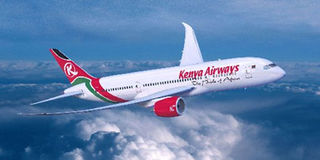State-owned to private and back, Kenya Airways flies full circle

A Kenya Airways plane in flight. PHOTO | FILE | NATION MEDIA GROUP
What you need to know:
- It was argued that KQ did not have the capacity to handle all the passenger traffic and cargo.
- The use of technology was still very low; almost everything was manual
Kenya Airways is about to revert to full government ownership after the privatisation experiment appears to have failed. That reminds me of my first day in late 1987, when President Moi appointed me as its CEO. It was made very clear to me that my main job was going to prepare the airline for privatisation.
My new board, working with management, made progress in addressing some of those issues but we got the sack before we were through. A major contributor to our sacking had to do with our acquisition of aeroplanes at reasonable prices, which may not have pleased some powerful vested interests.
The issues that my team found included, one that the country had an “open sky” aviation policy where almost any airline could easily get approval to operate. It was argued that KQ did not have the capacity to handle all the passenger traffic and cargo.
TECHNOLOGY
Secondly, our old aircraft fleet was not competitive, especially on our main European routes, leading to high maintenance costs. Thirdly, the critical and profitable African network was almost non-existent. Fourthly, use of technology was still very low; almost everything was manual. Fifthly, we had less than 20 university graduates in a 4,000-strong workforce. Lastly, State ownership led to bureaucratic delays in decisions, hence loss of opportunities.
These are things that we had to deal with as well as attending to the daily operation of the national carrier. I still had to find time to work as president of AFRAA and, at one point, its acting secretary-general, and later as president of IATA.
We became very aggressive against the Transport ministry on approval of licences to our competitors. Kenya was too generous with this important national asset called traffic rights. It was, and still is, almost impossible to easily enter such markets as Ethiopia, our major regional competitor.
Secondly, we added to the modern Airbus fleet, acquired modern Fokker 50s and leased Boeing 757s as part of our modernisation.
GOVERNMENT INTERFERENCE
Thirdly, we expanded the lucrative African network but faced government interference: We were all set to fly to West Africa and South Africa, only to be stopped at the last minute.
On human resources issues, we became a major employer of university graduates as management trainees. These would later become the core operators of the airline with some moving on to become senior government officials, politicians and managers of other airlines.
This enabled us to introduce technology. We undertook a major redundancy exercise that reduced staff numbers to reasonable levels. Finally, we introduced a pilot apprenticeship programme for pilot funded by UNDP.
It was time to now find a joint venture partner. It was decided that we would not go for a European partner as they were our competitors in Africa. We settled on Japan Airlines, JAL; they sent a member of their staff to work with us to do due diligence on KQ. But soon after our departure, the government brought in KLM as a partner. It did not make sense and I am not surprised that it has failed. Meanwhile, the new board had brought in a BA management team to run the airline.
After many years of KQ making losses the government has decided to go back to the original State-owned corporation status. It should watch closely the following:
One, the two regional main regional competitors, Ethiopian and RwandAir, operate in a much more politically controlled environment. KQ does not. Two, the two countries are competing with Nairobi to make their capitals the regional hubs.
EXPENSIVE TICKETS
Three, we should compare the purchase prices of our aeroplanes with theirs. I suspect ours are more expensive on similar-type aircraft. This may explain why KQ tickets are more expensive. Four, given the volumes of cargo that pass through our airports, KQ should invest in cargo business.
Lastly, it should put aviation-knowledgable teams at the board and management levels. Also, isolate KQ from the normal parastatal controls that hinder timely decision-making, leading to big losses. The President-chaired National Civil Aviation Council has no choice but to make this happen. KQ has gone full circle and we wish our national carrier success.
Mr Nyagah, a former Cabinet minister, was CEO of Kenya Airways. [email protected].




